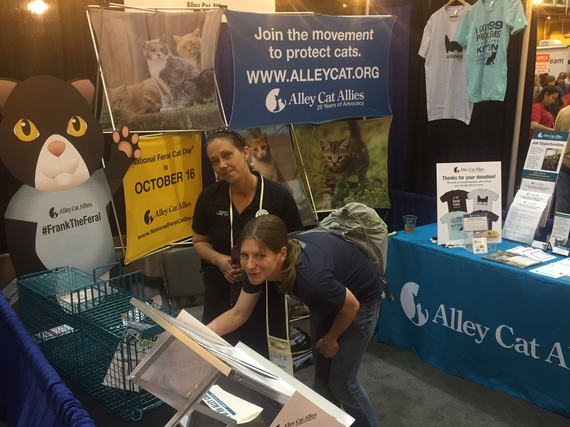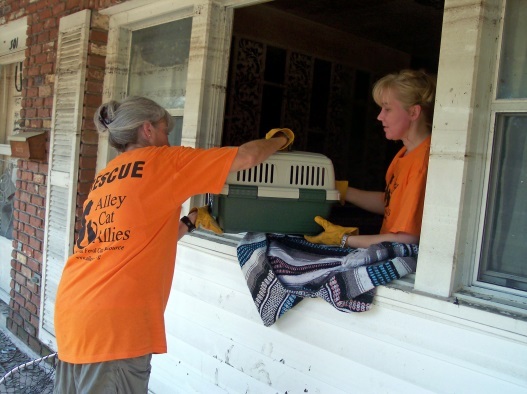In a city known for boisterous celebrations, there is new reason for optimism in New Orleans this week. More than 2,000 animal protection advocates have descended upon The Big Easy for the Humane Society of the United States' annual Animal Care Expo. Many of these out-of-towners, including Alley Cat Allies employees and volunteers, served as boots-on-the-ground volunteers helping to rescue thousands of displaced cats in the aftermath of Hurricane Katrina almost ten years ago. As we return to New Orleans this week, we revel in the satisfaction of knowing the enormous strides that have taken place with regard to feline protection policies over the past decade. We are not where we need to be yet -- but momentum builds every day -- and you can be part of our growing movement.
It was one of the worst natural disasters in American history. Hurricane Katrina shed a sobering light on, yet ultimately served to evolve inadequate and inhumane animal evacuation and rescue protocol during natural disasters. Case in point -- in the days following Katrina, local shelters refused entry to cats taken there by evacuated pet owners, themselves suddenly homeless, hungry, and traumatized. Thousands of cats were left behind and forgotten in the flooded homes and streets of New Orleans, frightened, lost, and hungry. The good news is, in the years since Katrina, new state and federal laws, including the Pet Evacuation and Transportation Standards (PETS) Act, have been passed that specifically address the management of displaced animals within disaster planning protocol, to mitigate such chaos and confusion when the next disaster strikes.
What's more, national animal protection organizations themselves have evolved their policies in years since Katrina. As we interface with our national animal protection partners in New Orleans this week, my colleagues at Alley Cat Allies can't help but take heart in noting one of the Expo's key themes: the humane management of cat populations. We've learned the Humane Society of Louisiana, Plaquemines Cat, and the Louisiana SPCA regularly educate the general public, eager for answers on how to handle cats in their communities, on Trap-Neuter-Return (TNR), the practice of humanely trapping outdoor cats, spaying/neutering and vaccinating them, eartipping them for identification, and then returning them to their outdoor homes. Volunteers are regularly deployed to assist confused citizens with TNR next steps. While TNR was practiced in Louisiana long before Hurricane Katrina, it has gained a renewed vibrancy in the state since the disaster. Thankfully, the practice is replacing the traditional and inhumane "catch and kill" approach to feral cats, in which healthy cats are rounded up and killed at shelters. Numerous studies have shown catch and kill has failed to stabilize populations and TNR has proven highly effective. What was once considered a slightly "radical" approach, often quietly evangelized about in the homes and basements of local churches here in New Orleans and across America, is now a trusted and mainstream protocol. Most important of all -- TNR is the only humane, effective approach and simply the right thing to do.
We've come a long way in the past decade, but there is still a lot more work to be done when it comes to changing hearts, minds, and antiquated polices. Though many animal control agencies and shelters have altered their approach to cats, as we look ahead to the next decade, we as taxpayers and informed members of the general public need to ensure every agency and shelter follows suit. Over the past five years, more than 1,500 events aimed at educating the public about community cat populations have taken place in conjunction with National Feral Cat Day, which falls annually on October 16. We ask that 2015 be the year you get involved. It's easy to get started -- just visit Nationalferalcatday.org. On behalf of our feline friends here in The Big Easy this week and all across the nation, a heartfelt thank you to our 500,000 existing supporters -- and an enthusiastic call to action to the new friends and supporters we know are out there -- and whom we look forward to meeting!
Becky Robinson is the President and Founder of Alley Cat Allies, the only national advocacy organization dedicated to the protection and humane treatment of cats.


